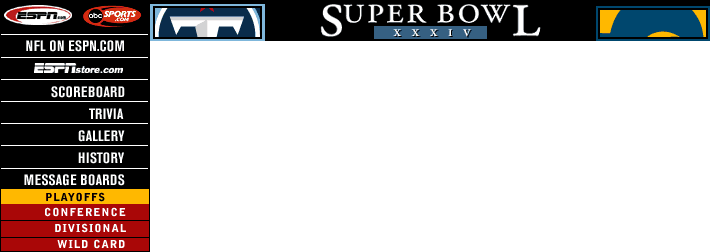ATLANTA -- Knowing coach Jeff Fisher, he won't deviate much from what got the Tennessee Titans to Super Bowl XXXIV.
|  |
|
| If Eddie George gets 25-30 carries, the Titans will be in great shape. |
Fisher, as a former player with the Chicago Bears and a coach schooled under Buddy Ryan, likes to play the 46 defense, perhaps with a few wrinkles. The Titans won't play two safeties deep, except for once in a while. They will line up and try to manhandle the other team; that's the way they won 13 regular-season games and three more in the playoffs. Why would they change now?
Early in the game, the Titans will do everything they can to get to Rams quarterback Kurt Warner and disrupt his rhythm. Tampa Bay did a good job of it, hitting and pressuring Warner all game. More importantly, though, the Titans defensive backs can't let the Rams receivers get unimpeded releases off the line of scrimmage. Even on motion plays, they must make them go the long route on their in-cuts. The cornerbacks need to maul and muscle the receivers.
Rams offensive coordinator Mike Martz will run motion and change formations to make sure his receivers get a free release into their routes. But the Titans, as a defense that utilizes man-to-man coverage, has two jobs: get physical with the receivers and then run with them, hoping the defensive line is applying the same pressure to Warner.
On offense, offensive coordinator Les Steckel won't come out and call 45 pass plays. Steckel wants to keep Steve McNair at around 22 to 29 pass attempts and let Eddie George carry the ball 25 times. If that happens, the Titans will win the game and dominate the time of possession. Tennessee will make some plays on the perimeter, but most of its big plays will come from someone like McNair or George. Other than that, the Titans will try to bloody the Rams' noses.
Fisher, Steckel and defensive coordinator Gregg Williams will play special attention to the positive things they did in the Oct. 31 game against the Rams. They will emphasize what worked over what didn't work. The Titans also are looking at film of the Rams' last four games, including the NFC title game. They won't spend too long on what Tampa Bay did against the Rams because the Bucs play a completely different defense -- a two-deep zone as opposed to press man-to-man coverage. The Titans will then take what they have learned and apply it to the things they do well.
Steckel and Williams will look at the Rams' weaknesses and how to attack them, as opposed to worrying about the Titans' strengths. The Titans will stick with their staple plays, with some variation in formation, motion and personnel. If they like to run the curl-flat route, they will still run the curl-flat route, but maybe out of a slot-receiver set with a different combination of players. It would get the Rams thinking, "Why is Kevin Dyson in the slot? What is he going to do?" Basically, he would be doing the same thing another player, like Yancey Thigpen or Isaac Byrd, might do in the same spot; it's just a different look.
The Titans will run screens -- and plays like 40 Gut off tackle -- to George and tight end Frank Wycheck to the flat. The Titans might say, "How can we get Wycheck down the middle?" While last week Wycheck was lined up at tight end, the Titans might move him to H-back and switch him with fellow tight end Jackie Harris. Let Harris run to the flat and Wycheck go down the middle of the field and to the corner.
The perception is that offenses have 500 plays, but that's not true. They have about 30 plays that they execute 500 times in practice, and that's why they are so good at what they do.
Here are the main things the Titans will try to do against the Rams in their Super Bowl game plan:
Offense
1. Move McNair's aiming point: The Titans won't keep McNair in the same spot all the time. Rams defensive end Kevin Carter led the league with 17 sacks, and Grant Wistrom is underrated at pressuring the quarterback. Why would Carter and Wistrom be allowed to come to the line of scrimmage and know where McNair will be when he drops back?
McNair will drop back five steps, throw on play-action, run a naked bootleg, roll left, drop three steps, sprint out and roll the pocket for a throwback. Regardless of the play design, McNair will change the aiming point anyway because he does that with his feet.
2. Stretch the field: It doesn't matter if the Titans do it a lot, but they should at least try to throw down the field early to back up the Rams secondary. That will create space underneath for the curl routes that the Titans like. While Thigpen is a good receiver, his absence from the game is overrated. Derrick Mason and Isaac Byrd are speedier receivers.
The Titans receivers are interchangeable. Tennessee should give the Rams a taste of their own medicine. On one of the first three plays in which McNair sees man-to-man coverage on the outside, he should audiblize and throw deep. If it's an interception, then they would have punted on fourth down anyway. An incompletion still will back up the Rams defense and get them thinking about the deep ball.
3. Whole lotta Eddie: George needs to get the ball 25 to 30 times. If he gets near 30 carries, the Titans will win the game. The Rams might have led the NFL in run defense, but it's a misleading statistic because they faced the fewest rushing attempts of any team in the league.
While the Rams are solid, the Titans like to line up and play macho football. The Titans will focus their running game between the tackles. George isn't a great east-west running back. As good as Rams linebacker London Fletcher is at running down plays, the Titans will run at him and be physical with him.
Defense
1. Keep Kearse moving: The Titans must move Jevon Kearse all over the place. Just like the Rams offense will motion players to create matchup problems, it's also a chess game for Kearse and where he will line up. If the Titans are moving Kearse around, the Rams would like him matched up with Orlando Pace all day.
One would expect Kearse to line up across from tackle Fred Miller, considering Kearse's success the last time they met. But what if the Rams have an extra tight end lined up next to Miller and then motion another player that way to help on Kearse? What happens if Kearse suddenly shifts to the other side before the snap? The Rams can't change their motion in the middle of the play.
That means the Rams would be double- or triple-teaming Kenny Holmes, which is fine, but Pace -- one of the best tackles in football -- would still have to deal with Kearse's speed on turf. The Titans can't allow the Rams to think they can chip and double-team Kearse on every play.
2. Leave Dorsett alone: The Titans need to allow free safety Anthony Dorsett, starting in place of the injured Marcus Robertson, to react and not think about what he is doing. Not that he can't do it, but this is the biggest game of his life, and he hasn't been a starter.
During practice, Robertson is helping Dorsett learn about taking care of the middle of the field. But Dorsett shouldn't be overcoached Sunday. The Titans coaches need to just let Dorsett go out and make plays. He is fast and physical enough to cover the Rams receivers.
3. Control the screen game: The Rams can screen the Titans to death. Teams love to run screens against zones because the linebackers drop deep. If the Titans are playing man-to-man coverage -- which is the style they prefer -- a player like linebacker Barron Wortham can run through and get in the screen lane.
Just by the coverage they call, the Titans can limit the screen yards. If Marshall Faulk is running a screen with Blaine Bishop covering him, the Titans won't care what fakes the Rams are doing to set up the play; they are going to get Faulk.
NFL analyst Sean Salisbury has analyzed the NFL Game of the Week all season on ESPN.com.



 Jeff Fisher knows his team is relaxed.
Jeff Fisher knows his team is relaxed. Kenny Holmes believes the Titans' defense is the fastest in the the league.
Kenny Holmes believes the Titans' defense is the fastest in the the league. Barron Wortham says Tennessee will suprise a lot of people.
Barron Wortham says Tennessee will suprise a lot of people.